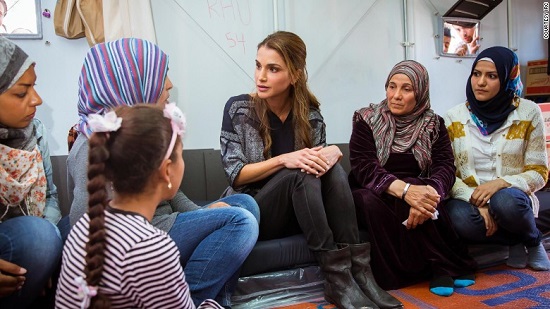This weekend, I picked up Nelson Mandela s "Long Walk to Freedom" and reread parts of this well-thumbed tome. The last time I read it, the world was a very different place; this time, I found that its themes of social inequality, injustice, resilience and courage resonated in new ways.
Why global leadership on refugees matters
By-Queen Rania Al Abdullah of Jordan- CNN
Article Of The Day
00:09
Thursday ,21 September 2017

Perhaps because of my work with the International Rescue Committee, I found myself reflecting on another long walk to freedom -- that of strong women, like Sherine.
Widowed before she was 20, pregnant and terrified of living under ISIS rule, in November, Sherine fled Mosul, Iraq. She wandered through desert, survived waves of fighting and dodged landmines -- all while searching for refuge to give birth.
Today, Sherine is safe. She and her son, Ihab, found temporary shelter in an IRC camp on the Syrian-Iraqi border. But her journey is far from over.
How right Madiba was when he said, "There is no easy walk to freedom. ..." In 2015, it was estimated that refugees and migrants collectively traveled more than 2 billion miles to find sanctuary, according to data from Eurostat.
Many continue that long walk to this day. The cruel irony is that far from reaching "freedom," numbers of countless innocents die en route. And given that every 20 minutes, someone is forced to flee his or her home somewhere in the world, even more will embark on that terrible journey.
In 2016 alone, 65.6 million displaced mothers, fathers and children were forced to walk away from everything they held dear to embark on the longest and most dangerous voyage of their lives in search of safe haven.
What would Madiba think of that?
Recognizing this unprecedented human catastrophe, this time last year, leaders of the world s wealthiest nations came together to sign the New York Declaration for Refugees and Migrants.
It pledged a 30% increase in humanitarian financing and a doubling of the number of slots for refugee resettlement to wealthy nations. They promised to provide critical relief and support to strategic allies and partners -- such as Jordan. In turn, refugee-hosting nations agreed to make policy changes to provide greater access to jobs and education for refugees.
How are immigrants and refugees different?
Twelve months on, while host countries have made progress on their commitments, wealthy nations have faltered.
Low- and middle-income countries, struggling to meet the needs of their own populations, are shouldering a disproportionate share of the refugee population.
Nearly 90% of the world s refugees are hosted in low- and middle-income countries. Countries such as mine, where one in five residents is a refugee, are doing their best to support those seeking safety and security.
Over the past six years, the cost of hosting 1.3 million Syrian refugees has exceeded $2 billion annually. That s more than one-fifth of our annual government budget revenue.
Our schools and health systems are bursting; our teachers are working double shifts to accommodate more than 130,000 school-age refugees. We ve issued close to 55,000 work permits. Our infrastructure, social services and economy are buckling under the strain. Nonetheless, Jordan -- and other countries such as mine -- continues to do the right thing.
The same cannot be said of wealthy nations.
In 2016, wealthy nations provided 63% of the $4.54 billion requested for the Syria region s response plan. This year, that plan is just 45.1% funded.
Worse yet, wealthy nations have walked away from their commitment to resettlement. Resettlement is an option available only to the most vulnerable refugees, those who the UN High Commissioner for Refugees has determined have no hope of returning home, and cannot be safely and securely cared for by host nations. Widowed mothers. Survivors of torture. Orphaned children. Victims of rape. Human beings who need specialized medical care.
Last year, the UNHCR identified more than 1.1 million refugees from among the world s 22.5 million refugees in need of resettlement. The UNHCR has called for 10% of Syrian refugees to be resettled.
So far, wealthy countries have resettled less than 3%. And this year, far from doubling opportunities for refugee resettlement, overall refugee resettlement numbers are expected to decline by as much as 60%.
Worst refugee crisis in history: what you should know
Worst refugee crisis in history: what you should know
This is an affront to some of the most vulnerable people in the world and to partners, such as the Jordanian people, who have opened their homes and their hearts because we see our common humanity in our neighbors.
So, when leaders reconvene in New York this month, I urge them to do the right thing. Don t turn away. Walk a few steps in refugees shoes and meet them on their long walk from despair to dignity. Because coming to the UN General Assembly is not a measure of success -- it s a feat of administration.
The measure of success for real leaders is the extent to which they deliver on promises that affect the lives of the most helpless and hopeless among us.
And if they falter, they would do well to reread the words of one of the greatest moral leaders of our time who reminds us of our common humanity and the values that connect as a family.
"Our human compassion binds us the one to the other -- not in pity or patronizingly, but as human beings who have learnt how to turn our common suffering into hope for the future."


